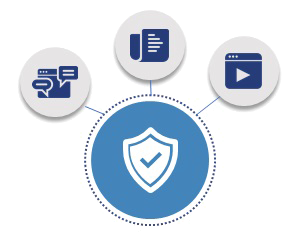The Importance of Identity in Higher Education

Identity and Access Management (IAM) describes how organizations grant different users specific data permissions under various contexts. IAM has become a critical tool that supports data security by ensuring that only authorized users and machines can access sensitive information at selected times, consequently curtailing cyberattacks. IAM programs, above all else, serve to reduce the human error risk, the leading cause of data breaches today.
With security professionals recognizing that identity is the new perimeter for securing data in private, public and hybrid clouds across all industries, introducing IAM and related cybersecurity training programs in higher education can present key identity management models and concepts to candidates seeking to help increase cyber resilience in organizations.
Introducing Identity Access Management Training in Higher Education
A cybersecurity course in higher education can introduce security professionals and learners to crucial identity and access management concepts. The demand for trained security professionals is evident among educators and higher education, spurring learning institutions and initiatives to create new partnership opportunities to bolster the future cybersecurity workforce.
Still, there is a lack of adequate training initiatives, and only a few institutions of higher learning offer a cybersecurity program. Introducing such courses in higher education is seasonable at a time when the number of unfilled cybersecurity jobs has grown by 350 percent from one million to 3.5 million positions between 2013 and 2021.
Introducing cybersecurity programs like IAM in higher education is beneficial to professionals and organizations alike. Today, a robust IAM program is a crucial part of an information security management system. It ensures users are who they say they are and allows access to appropriate systems and data. Therefore, a move to introduce IAM in higher education empowers organizations to deal with cybersecurity attacks and risks focused on identity management.
For instance, higher education players can collaborate with IAM experts to educate security professionals about the following concepts:
- IAM basics and their importance
- Identity governance and administration – user onboarding, user termination, role changes, access controls and role-based access controls, certification and access validation, auditing and reporting, cross-domain identity management, and auditing and reporting
- Customer identity access and management
- Data governance and protection
- Privileged account management – privileged account session management, privileged account monitoring, PAM solutions
- The meaning of concepts like identification, authentication, and authorization
- Identity solutions and processes – identity federation and SSO, web services federation and OAuth, authentication factors, account and session management
- Challenges of current IAM solutions – identity solutions related threats
- Corporate policies, processes, and technologies that support digital identity management
- Data security processes in IAM
- The future of identity and access management
Additionally, IAM and similar cybersecurity courses prove that learners are job-ready. Such new, job-relevant programs supplement professionals' existing qualifications. For those already in IT, such as data administrators, technical support professionals and systems administrators, adding IAM knowledge to their tool kit increased their efficacy in their roles. Additionally, cybersecurity training courses can also provide opportunities for those from non-technical backgrounds to bring their problem solving, communication, data analysis and project management skills to a new field. As a professional, you cannot go wrong with such initiatives at institutions of higher learning. According to a Cybersecurity Workforce Study 2020, organizations reach out to various sources to find the right cybersecurity talent, with educational institutions and new university graduates contributing up to 32 percent of the skilled cybersecurity workforce.
KeyData Collaborates with Rogers Cybersecure Catalyst Accelerated Cybersecurity Training Program
KeyData, a recognized leader in cybersecurity advisory, systems integration, and managed services in the areas of IAM, CIAM, CSM, and PAM, is a supporter of the Accelerated Cybersecurity Training program, an initiative of the Rogers Cybersecure Catalyst, Ryerson University’s national centre for innovation and collaboration in cybersecurity. Industry collaborations between higher education institutions will effectively close the current skills gap. As students continue to progress through the curriculum at the Rogers Cybersecure Catalyst they can leverage this relationship to learn the tools and trade toward becoming identity solutions experts.
Another point of view of this collaboration involves encouraging organizations to hire more women in cybersecurity roles. A recent survey reveals that women working in cybersecurity currently account for one-quarter (24%) of the overall workforce. Women's representation is essential since they offer diverse cybersecurity viewpoints and perspectives. In fact, 63% of learners at the The Rogers Cybersecure Catalyst Accelerated Cybersecurity Training Program identify as female.
In support of the Accelerated Cybersecurity Training Program, KeyData hosted a virtual event on May 4th with approx. 35 of their recent female alumni, to discuss the role of identity in cybersecurity and the different opportunities that exist in this exciting field.
About Rogers Cybersecure Catalyst Program
The Rogers Cybersecure Catalyst was announced in Fall 2018 to empower Canadians and Canadian businesses to take full advantage of the opportunities and respond to cybersecurity challenges through training and certification. The initiative based in Brampton, Ontario, leverages Ryerson University resources and entrepreneurial spirit to respond to critical cybersecurity issues and seize new opportunities. The Rogers Cybersecure Catalyst program also supports commercial acceleration and support for cyber scale-ups. Strong support from and collaboration with industry leaders like KeyData help drive the Rogers Cybersecurity Catalyst initiatives.
About KeyData
Founded in 2005, KeyData has been serving clients for over 16 years, effectually becoming a recognized leader in cybersecurity services specializing in a complete set of IAM, CIAM, and PAM services. KeyData also offers advisory, consulting, systems integration, and fully managed services to support clients' identity programs.
KeyData provides solutions to a broad range of clients, including many from Fortune 500 organizations to Fortune 2000 from all industries, including financial services, energy/utilities, government, healthcare, telecom, and more. What's more, KeyData's methodologies are based on operational risk management principles (COSO, ISO 31000) and incorporate industry-leading IAM, CIAM, CSM, and PAM best practices.
Visit the new Rogers Cybersecure Catalyst website (www.cybersecurecatalyst.ca) for details on applying for future cohorts of the Accelerated Cybersecurity Training program.





